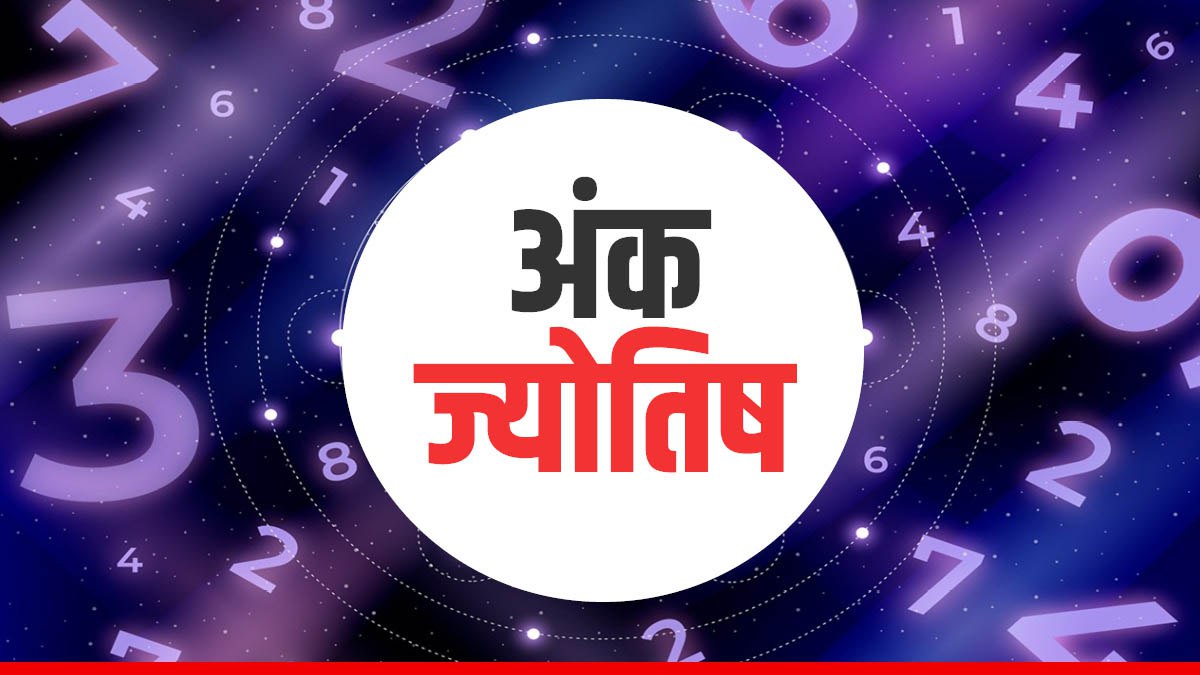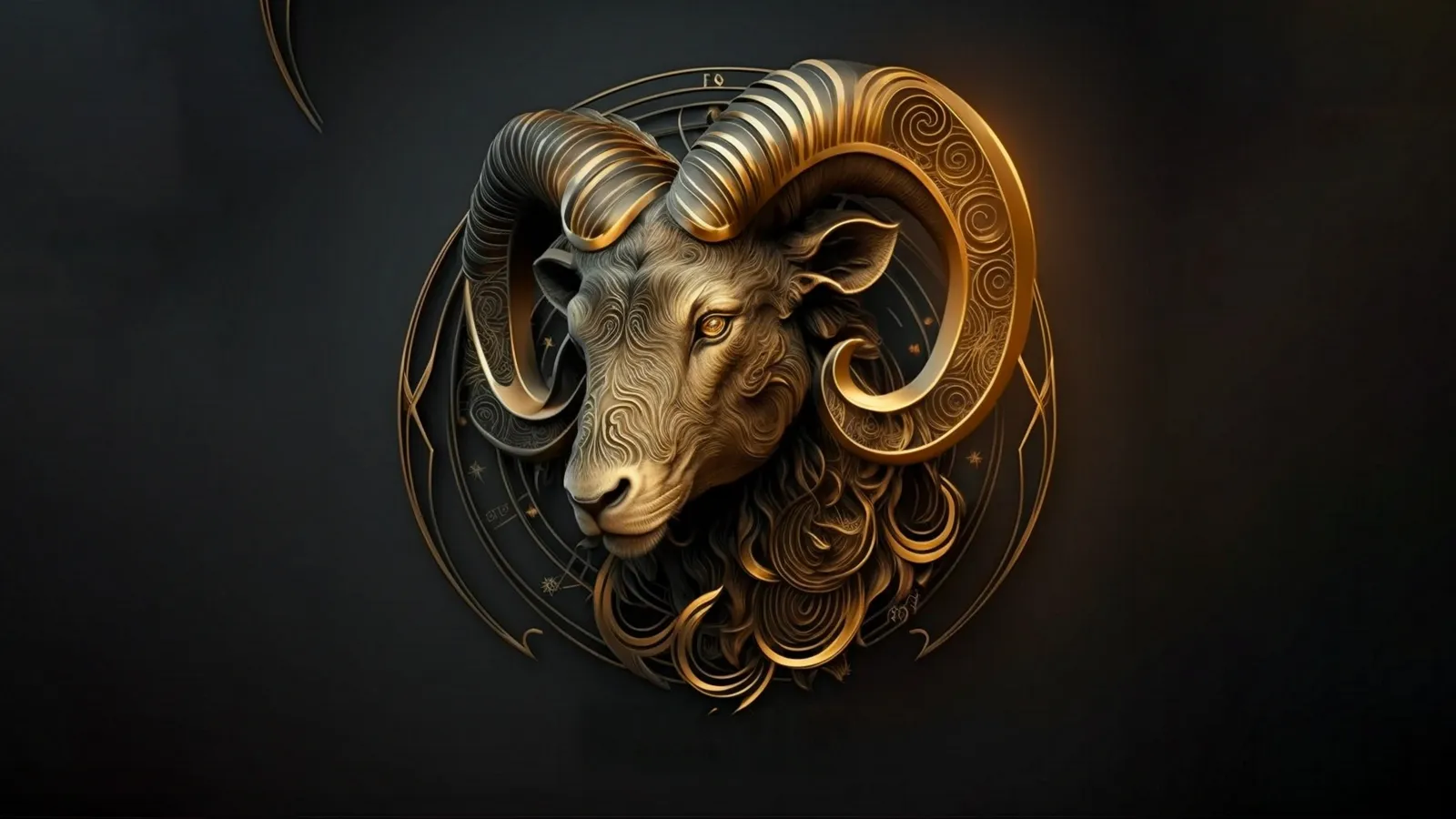First house in astrology :-
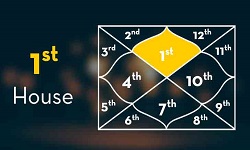
The “first house” in a Kundali (also known as a birth chart or natal chart) represents the “Ascendant” or “Rising Sign.” It is one of the most crucial houses in astrology as it sets the stage for the entire chart and significantly influences an individual’s personality, physical appearance, self-expression, and approach to life. The first house represents the individual’s identity, ego, self-image, and how they present themselves to the world. It also reflects their overall outlook on life and their inherent characteristics. The planetary placement and aspects within this house provide valuable insights into a person’s temperament, behavior, and general demeanor.
Second house in astrology :-
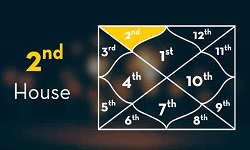
The “second house” in a Kundali (birth chart) represents the “House of Finances” or “House of Wealth.” It is one of the 12 astrological houses, and its placement and planetary influences provide insights into a person’s financial situation, material possessions, and overall attitude towards money and wealth.
The second house is associated with several key aspects:
- Finances and Wealth: It reveals a person’s potential to accumulate wealth and manage financial resources.
- Personal Income: This house indicates the individual’s earnings, income sources, and financial stability.
- Possessions: It governs material possessions, including valuable assets and property.
- Self-worth and Values: The second house also relates to a person’s self-esteem, values, and self-worth.
- Family and Inheritance: It can provide information about family wealth, inheritance, and financial support from family members.
- Speech and Communication: The second house is also connected to communication skills and the way a person expresses themselves verbally.
The planetary placements and aspects within the second house further refine the interpretation of an individual’s financial situation and attitudes towards money.
Third house in astrology:-
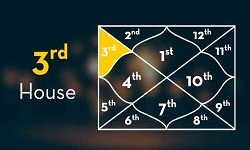
The third house in a Kundali (also known as a birth chart or horoscope) represents communication, siblings, courage, short journeys, hobbies, and intellectual pursuits. It indicates how an individual interacts with their immediate environment, communicates with others, and the nature of relationships with siblings and close relatives. The third house also provides insights into one’s curiosity, adaptability, and inclination towards learning and gaining knowledge. It plays a significant role in determining the person’s communication style, interests, and potential for success in fields requiring mental agility and quick thinking.
fourth house in astrology:-
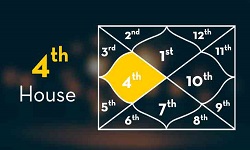
The “fourth house” in a Kundali (also known as a birth chart or horoscope) represents the “Home and Family” aspect of a person’s life. It provides insights into various aspects related to one’s home life, family, domestic environment, ancestral heritage, and emotional foundations.
Here are some key themes associated with the fourth house in a Kundali:
- Home Life: The fourth house indicates the individual’s upbringing, childhood experiences, and the overall atmosphere at home.
- Family and Ancestry: It reflects the relationship with parents, especially the mother, and the connection to one’s ancestors and roots.
- Emotional Foundations: This house governs the emotional security, feelings of comfort, and sense of belonging in one’s life.
- Real Estate and Property: It also pertains to property ownership, real estate, and one’s dwelling place.
- End of Life Matters: The fourth house is also related to the end of life matters and the conditions at the end of life.
The position of planets and their aspects in the fourth house can provide more detailed information about the individual’s family life, relationship with parents, the overall emotional well-being, and the potential experiences related to home and property matters.
Fifth house in astrology:-
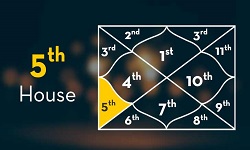
The “fifth house” in a Kundali (birth chart or horoscope) represents the “Creativity, Romance, Children, and Education” aspect of a person’s life. It provides insights into various aspects related to one’s creative abilities, romantic relationships, children, and educational pursuits.
Here are some key themes associated with the fifth house in a Kundali:
- Creativity and Self-Expression: The fifth house governs artistic talents, creative expression, hobbies, and the capacity to find joy and fulfillment through self-expression.
- Romantic Relationships: It relates to romantic interests, love affairs, dating, and the experiences and challenges faced in romantic relationships.
- Children and Parenthood: This house is also associated with children, parenthood, and the nurturing qualities of an individual.
- Education and Learning: The fifth house signifies education, learning, knowledge-seeking, and the pursuit of intellectual interests.
- Speculative Ventures: It is connected to speculative activities, such as gambling and stock market investments.
- Pleasure and Enjoyment: The fifth house is about seeking pleasure, entertainment, and activities that bring joy and happiness.
The positioning of planets and their aspects in the fifth house can offer more detailed insights into the individual’s creative inclinations, romantic experiences, relationships with children, educational opportunities, and overall capacity for joy and enjoyment in life.
Sixth house in astrology:-
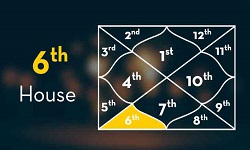
The sixth house in a Kundali (also known as the birth chart or horoscope) represents the following aspects of a person’s life:
- Health and Wellness: The sixth house is associated with health matters, diseases, and general well-being. It indicates the potential for physical and mental health issues, as well as the ability to overcome challenges related to health.
- Work and Service: This house relates to one’s job, employment, and daily work routine. It shows the type of work a person is inclined towards and their ability to perform tasks diligently and efficiently.
- Routine and Responsibilities: The sixth house signifies daily responsibilities, duties, and obligations. It reflects how well a person handles their daily routines and manages their day-to-day life.
- Service to Others: This house also indicates service towards others, including charity work, volunteerism, and how one helps those in need.
- Enemies and Competitors: The sixth house represents enemies, competitors, and opponents in one’s life. It shows the potential challenges and conflicts that may arise due to these individuals.
- Pets and Small Animals: The sixth house is also associated with pets and small animals, indicating the possibility of having pets and the nature of the relationship with them.
Remember, the interpretation of the sixth house can vary depending on the planets placed in it, aspects from other planets, and the overall context of the birth chart. Professional astrologers often analyze these factors to provide a comprehensive reading of a person’s life based on their Kundali.
Seventh house in astrology:-
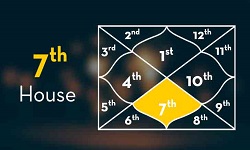
the seventh house in a Kundali (also known as the birth chart or horoscope) represents the following aspects of a person’s life:
- Relationships and Marriage: The seventh house is primarily associated with marriage, partnerships, and committed relationships. It reveals information about the quality of one’s relationships and the type of partner one is likely to attract.
- Partnership and Collaboration: This house signifies business partnerships and collaborations. It shows the potential for successful joint ventures and the ability to work harmoniously with others.
- Legal Matters and Contracts: The seventh house is also linked to legal matters, contracts, and agreements. It indicates how one deals with legal issues and how successful they may be in legal proceedings.
- Open Enemies: In contrast to the sixth house, which represents hidden enemies, the seventh house signifies open enemies or adversaries who are known to the person. It shows the potential for conflicts and opposition from others.
- Diplomacy and Negotiation: This house relates to diplomacy, negotiation skills, and the ability to find a middle ground in conflicts. It indicates how well a person can navigate disputes and maintain harmony in relationships.
- Attraction and Compatibility: The seventh house reveals what qualities and traits a person is attracted to in a partner and the level of compatibility they may have with their significant other.
- Public Image and Reputation: This house also plays a role in shaping a person’s public image and reputation, especially in the context of their relationships and partnerships.
Remember that the interpretation of the seventh house can be influenced by the planets placed in it, aspects from other planets, and the overall context of the birth chart. An astrologer will consider these factors to provide a comprehensive reading of a person’s life based on their Kundali.
Eighth house in astrology:-

The “eighth house” in a Kundali (Vedic astrology birth chart) is known as the “House of Transformation” or the “House of Longevity.” It represents various aspects related to transformation, changes, and hidden matters in a person’s life. Some key significations of the eighth house include:
- Transformation and Change: This house represents major transformations, changes, and upheavals that a person may experience in their life, both externally and internally.
- Occult and Mystical Matters: It is associated with occult sciences, mystical experiences, and the study of hidden knowledge, such as astrology, spirituality, and metaphysics.
- Death and Rebirth: The eighth house is traditionally linked to matters of death, but it also signifies rebirth and regeneration. It may not necessarily indicate physical death but can represent significant transformations or endings in one’s life.
- Inheritance and Shared Resources: It governs inheritance, legacies, and shared resources, including those received through marriage, partnerships, or financial investments.
- Intimacy and Sexual Matters: This house is also related to intimate relationships, deep emotional connections, and sexual experiences.
- Taxes, Debts, and Loans: The eighth house is associated with taxes, debts, loans, and other financial obligations.
- Longevity and Health: It also provides insights into a person’s longevity and overall health.
- Psychological and Emotional Depth: This house represents psychological and emotional depth, including fears, traumas, and hidden aspects of the psyche.
Overall, the eighth house in a Kundali reveals significant insights into a person’s capacity to undergo transformations, handle life’s ups and downs, and understand their deeper psychological and spiritual nature.
Ninth house in astrology:-
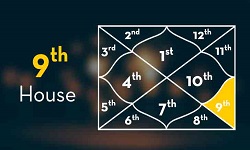
The Ninth House in a Kundali (also known as a birth chart or horoscope) represents “The House of Higher Learning, Wisdom, and Spiritual Exploration.” This house is associated with various aspects related to the individual’s quest for knowledge, philosophy, spirituality, higher education, long-distance travel, and experiences that expand one’s consciousness and understanding of the world.
Here are some key significations of the Ninth House in a Kundali:
- Higher Education: This house indicates the individual’s pursuit of advanced education, including university studies, higher learning, and specialized training.
- Philosophy and Beliefs: It governs the individual’s philosophical outlook, religious beliefs, and spiritual inclinations.
- Long-distance Travel: The Ninth House is associated with journeys to distant places, especially those taken for educational or spiritual purposes.
- Spiritual Growth: It reflects the person’s interest in spiritual growth, enlightenment, and seeking deeper meanings in life.
- Foreign Connections: This house can indicate relationships or experiences with people from foreign countries or cultures.
- Legal Matters: The Ninth House is also linked to legal matters, such as lawsuits, international law, and legal education.
- Publishing and Media: It may be connected to publishing, writing, and media-related professions.
- Exploration and Adventure: The Ninth House signifies a desire for exploration, adventure, and the pursuit of new experiences.
- Teacher and Guru: This house is related to teachers, mentors, and spiritual guides who play significant roles in the person’s life.
Overall, the Ninth House represents the individual’s broader perspective on life, their quest for truth and knowledge, and their willingness to explore beyond the limitations of their immediate environment.
Tenth house in astrology:-

In English, the “tenth house” in a Kundali (Vedic astrology birth chart) is referred to as the “House of Career” or the “House of Profession.” It represents various aspects related to an individual’s career, profession, social status, achievements, and public recognition. The planetary placements and aspects in the tenth house can provide insights into a person’s career prospects, ambition, success, reputation, and how they are perceived in the public eye. It also indicates the person’s potential for leadership, authority, and their ability to climb the professional ladder.
Eleventh house in astrology:-
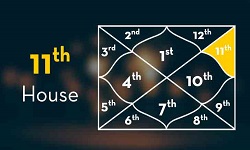
The “eleventh house” in a Kundali (Vedic astrology birth chart) is referred to as the “House of Gains” or the “House of Income.” It represents various aspects related to the individual’s income, financial gains, friendships, social network, aspirations, and achievements in life.
The eleventh house is associated with one’s hopes, wishes, and desires, and it indicates the potential for fulfillment of these aspirations through networking, social connections, and group activities. It also signifies gains from various sources, such as business endeavors, investments, or even unexpected windfalls.
Moreover, this house can reveal the kind of friends and acquaintances the person is likely to have and their role in supporting or influencing the individual’s ambitions and financial growth. The planetary placements and aspects in the eleventh house can provide insights into the person’s approach to achieving their goals, their ability to attract opportunities, and the strength of their social support network.
the eleventh house of a Kundali (also known as a birth chart or horoscope) represents various aspects of a person’s life and social interactions. It is commonly referred to as the “House of Gains” or “House of Income.” The eleventh house signifies the following key themes:
- Friendships and Social Circles: It indicates the native’s friendships, acquaintances, and their ability to form and maintain social connections.
- Ambitions and Aspirations: The eleventh house shows the individual’s hopes, dreams, and long-term goals, as well as their level of ambition.
- Income and Earnings: It reflects the individual’s sources of income, financial gains, and prosperity.
- Achievements and Success: This house is associated with recognition, achievements, and accomplishments in life.
- Networking and Community Involvement: The eleventh house also relates to networking skills, community involvement, and participation in groups or organizations.
- Social Influence and Support: It indicates the support and patronage the individual may receive from influential or powerful people.
- Fulfillment of Desires: This house also relates to the fulfillment of desires and wishes, and whether one’s desires are easily attainable.
- Acquaintances with Beneficial People: The eleventh house represents relationships with well-wishing and supportive individuals who can aid the native in their endeavors.
Overall, the eleventh house reflects a person’s ability to build social connections, achieve their goals, and experience prosperity and gains through their associations with others. The specific influences and manifestations in a person’s life are determined by the planets and signs present in this house.
Twelfth house in astrology:-

the twelfth house of a Kundali (birth chart or horoscope) represents various aspects of a person’s life related to spirituality, subconscious mind, self-undoing, and seclusion. It is often referred to as the “House of Loss” or “House of Subconscious.”
The twelfth house signifies the following key themes:
- Spirituality and Inner Self: This house is associated with a person’s spiritual inclinations, inner journey, and connection to higher consciousness.
- Subconscious Mind: The twelfth house relates to the hidden aspects of the mind, dreams, intuition, and the individual’s ability to tap into their subconscious.
- Seclusion and Retreat: It represents periods of withdrawal, isolation, or seclusion, which may be necessary for introspection or healing.
- Hidden Enemies and Limitations: This house can indicate hidden enemies, self-sabotaging tendencies, or limitations that a person may face in life.
- Moksha and Liberation: The twelfth house is also linked to the concept of moksha or liberation, where the individual seeks freedom from material attachments and the cycle of rebirth.
- Charity and Compassion: It relates to acts of charity, compassion, and serving others, as well as the person’s ability to let go of personal desires for the greater good.
- Loss and Expenditure: The twelfth house is associated with loss, both material and emotional, as well as expenses and financial outflows.
- Hidden Talents and Creativity: It can reveal hidden talents, creativity, and potential that the person may not fully recognize or utilize.
- Past Life and Karma: This house is also connected to past-life karma and experiences that may influence the current life.
The twelfth house represents a more introspective and subconscious aspect of a person’s life. It deals with elements that are not always apparent on the surface but can significantly impact the individual’s spiritual growth and understanding of the self. The specific influences and manifestations in a person’s life are determined by the planets and signs present in this house.

